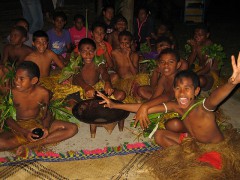The commercialisation of Fiji’s national drink and its impact on rural women

The Fijian custom was for men to gather in social groups to drink kava while the women were expected to wait on them and do the housework. Historically, when male high chiefs drank kava, it was the womens’ responsibility to tend to them as part of the ritual known as ‘kavakava’. Fiji is a society where women manage the household and the finances. Modern economic pressures mean that people living in rural areas must travel to the cities for work. Women, expected to manage the finances, also earn the income while it is acceptable for men to gather to drink kava.
However, the increase in kava consumption has created a significant social problem. As kava becomes more readily available, it has had an impact on the productivity and social fabric of families in Fiji.
Consequently, over the past few years various organisations and villages have begun banning or limiting kava. On the Island of Ovalau, kava bans have significantly increased crop production. For Fiji, such bans have cultural implications as they go against centuries of culture and tradition. But kava directly affects the nervous system and numbs the body making people lazy and unproductive. This has seen men indulge in ‘kava drinking sessions’ that force women to act as both breadwinners and homemakers, while the consumption of kava by men increases. As rural women are expected to fulfil these roles, they are unable to access other opportunities that would normally be available to women. Roko Tui Vuma Usaia Delai was the chief behind the kava ban in Ovalau.
“Before, men were drinking kava till three in the morning, or daylight so farming levels were pretty low. Village elders sat down and decided we couldn’t carry on like this so the ban was put in place and it even applies for funeral gatherings that will only take place at the weekend when kava consumption is allowed. We’ve noticed the change this ban has made already because some of our men have expanded the size of their farms and have as many as 3000 yaqona plants and so much more dalo,” he said.
This huge expectations on women ensure that they are unable to pursue alternative opportunities; some women are expected to complete only domestic chores and other women are expected to be the income earners in addition to completing domestic chores, while in many cases, their male partners drink kava.
Areta Tuvuki travels with her husband the long distance from her small rural town to the Suva flea market every day to sell handicrafts and earn a living. She is usually left to manage their stall while her husband sits around with other men at the market and consumes kava.
“Times are hard and most days we don’t even make a single cent. But we do make a bit of money when a cruise ship docks at the wharf because tourists are very eager to buy our local handicrafts. Most of the money I make goes on feeding my four children and travel expenses,” says Tuvuki.
Tuvuki does not see anything wrong with having to tend her family’s stall alone while her husband sits around drinking kava, as it has become a culturally accepted practice. On average they make about $30 to $40 Australian dollars a week and none of it can be saved for education or an emergency. In Fiji, having only one member of the family earning an income is not enough to meet rising living expenses.
Tags: australasia, economy, Fiji, Fijian women, gender inequality, GLOBALISATION, kava, kava consumption, modernity, Poor Women





